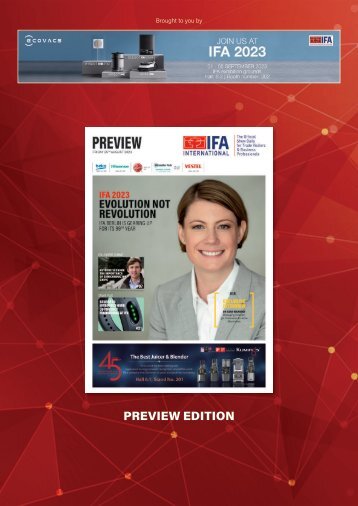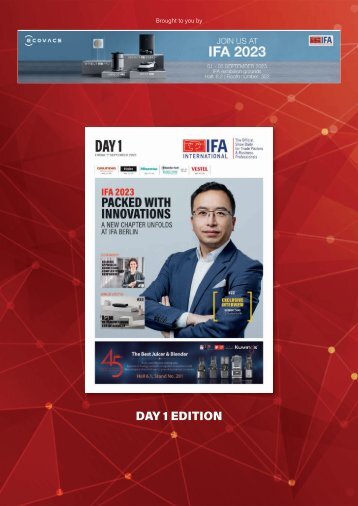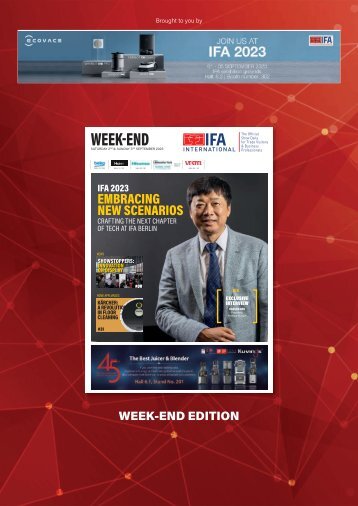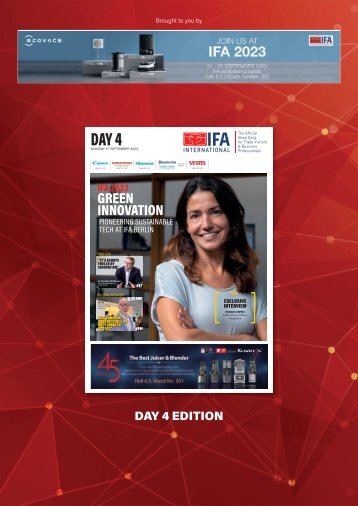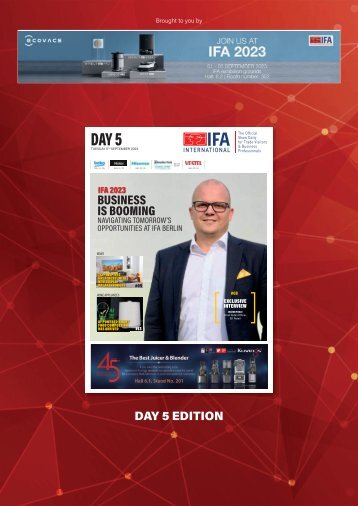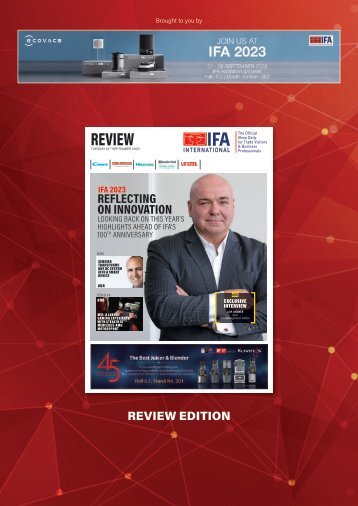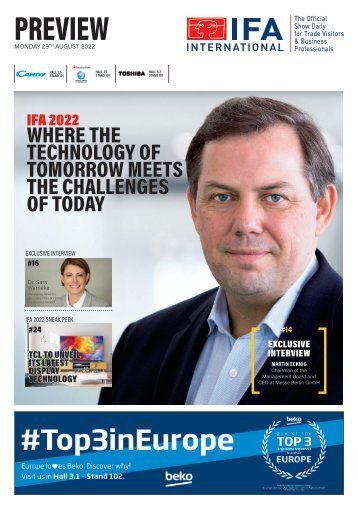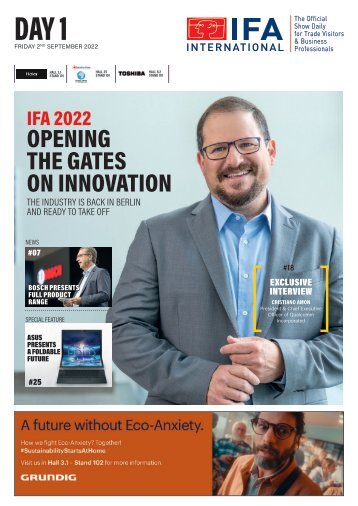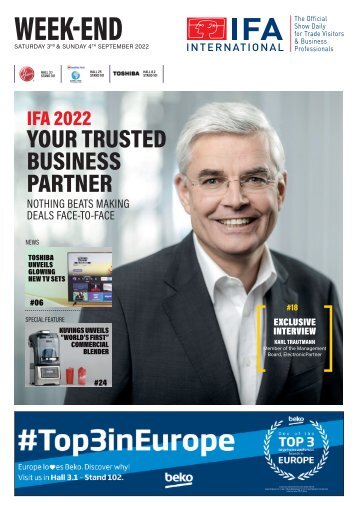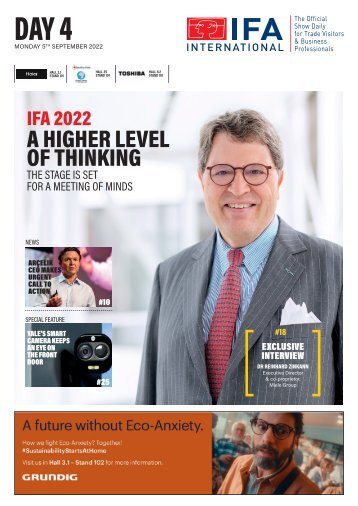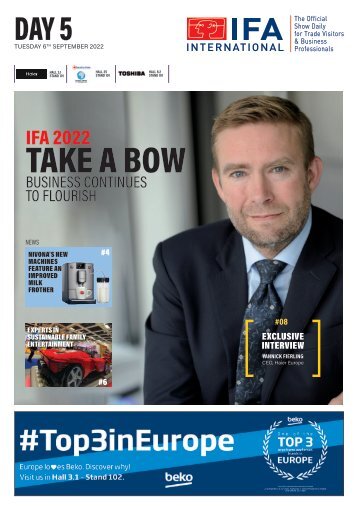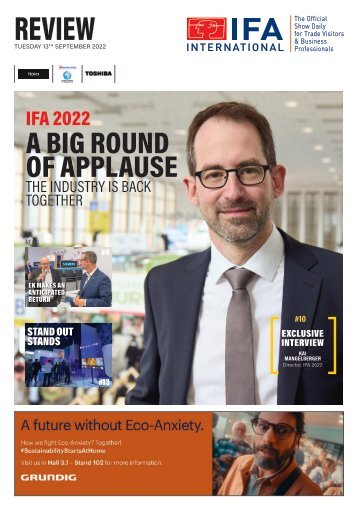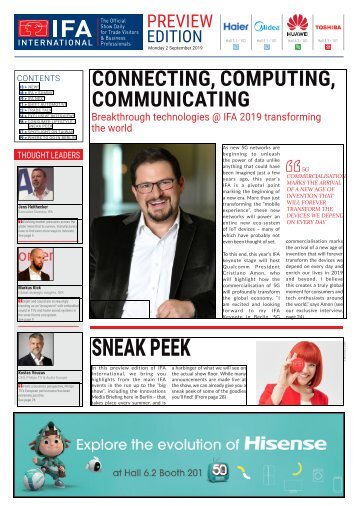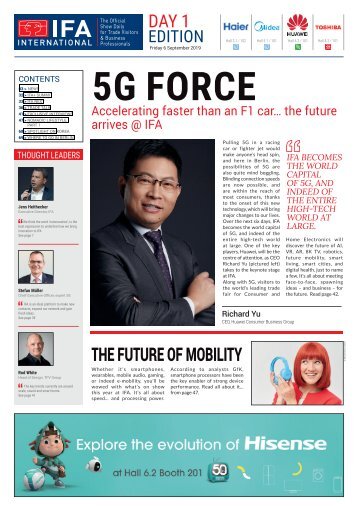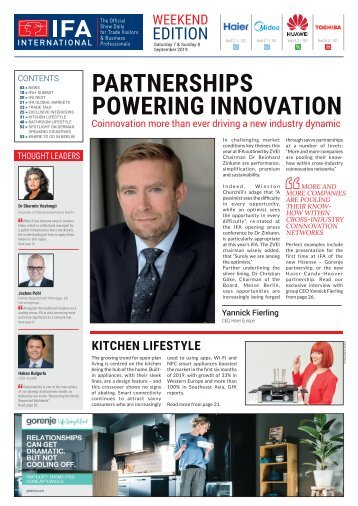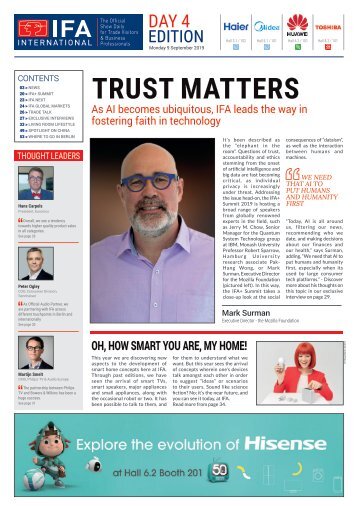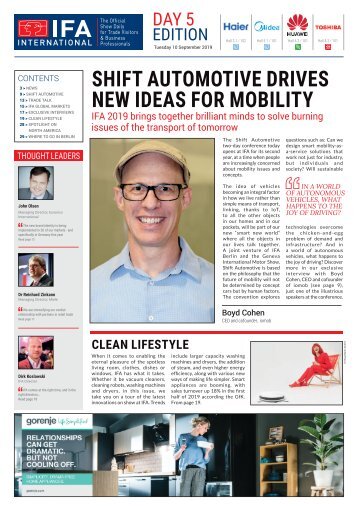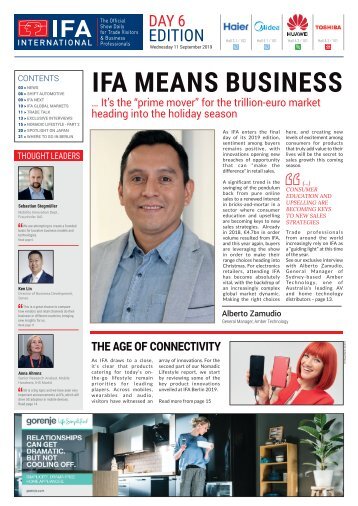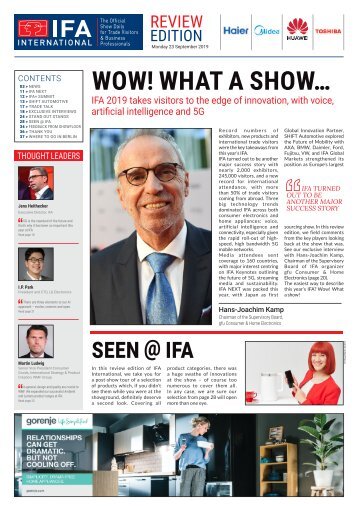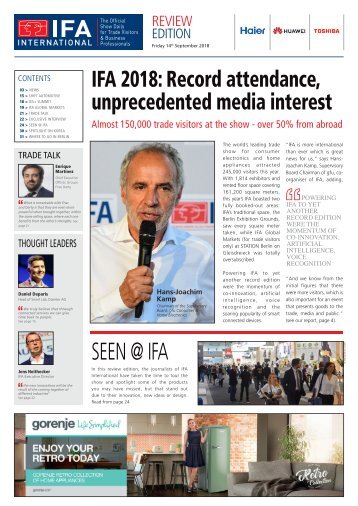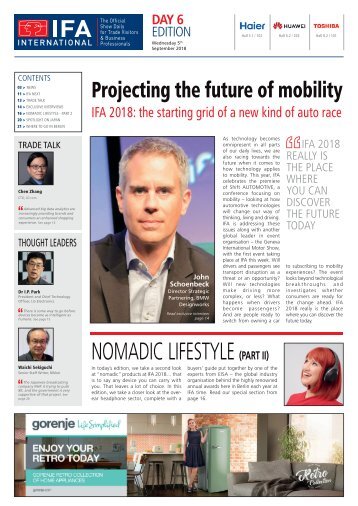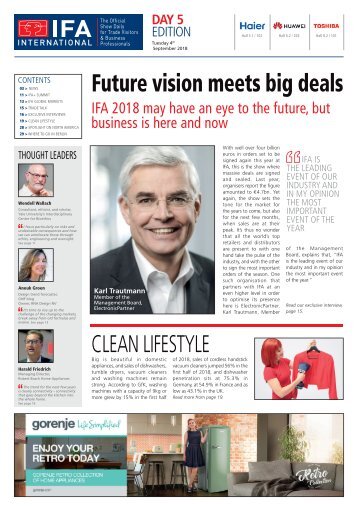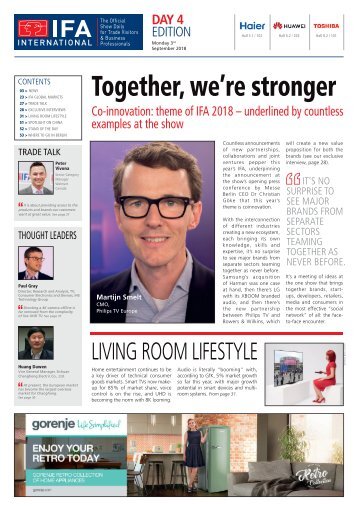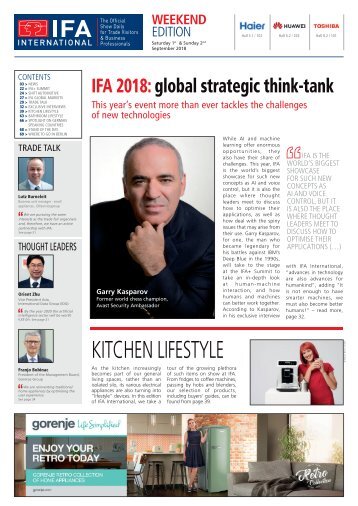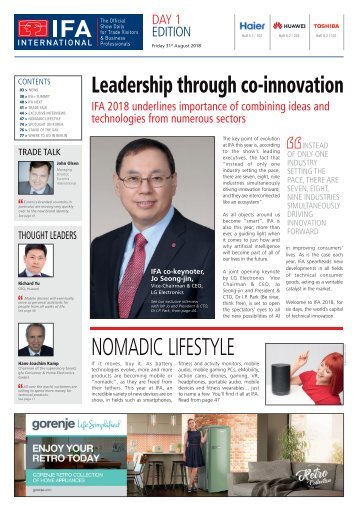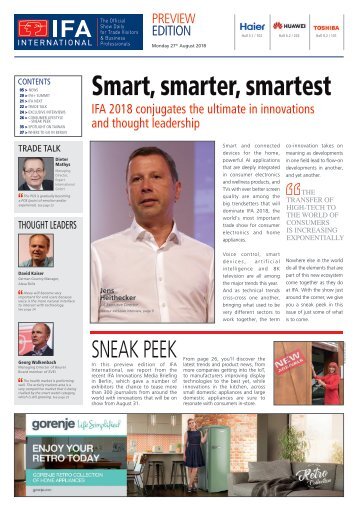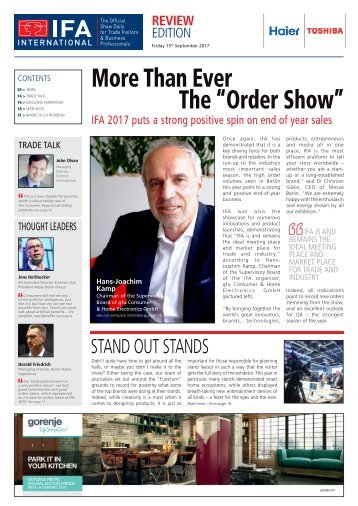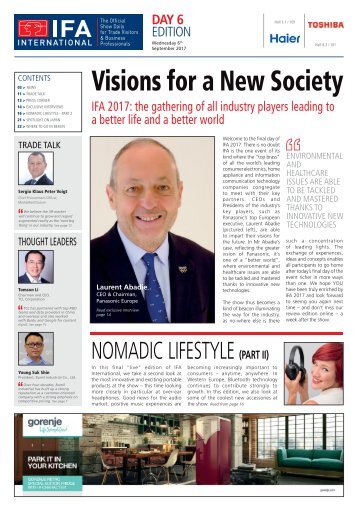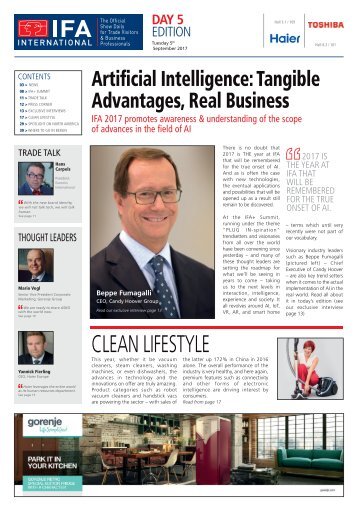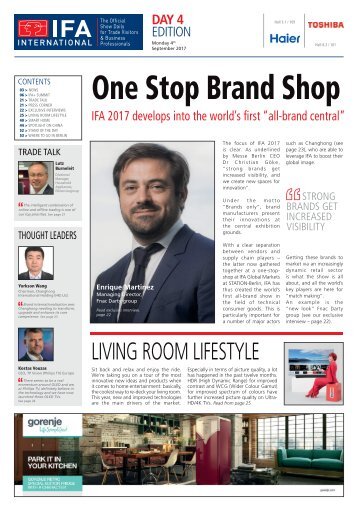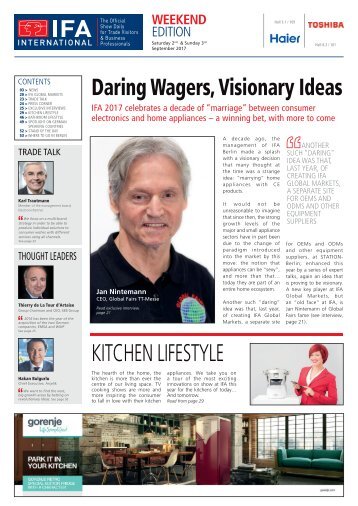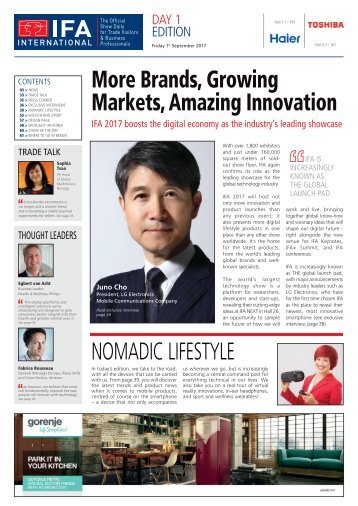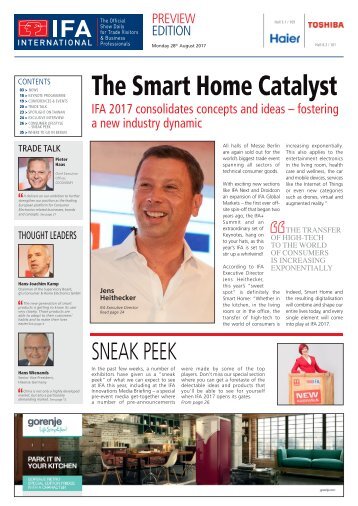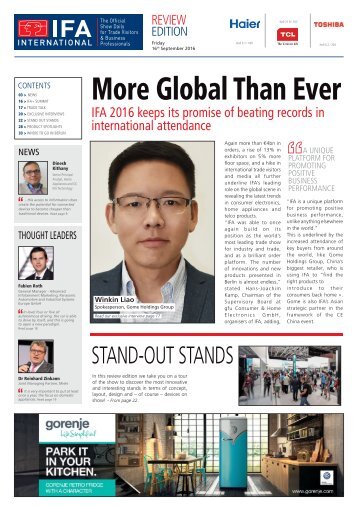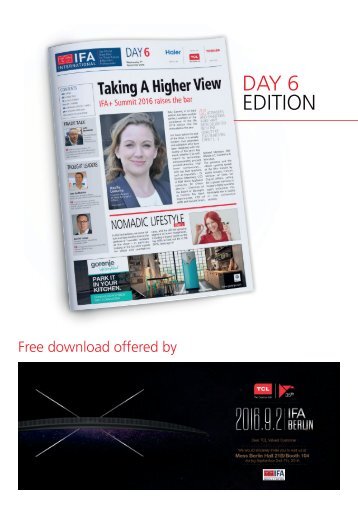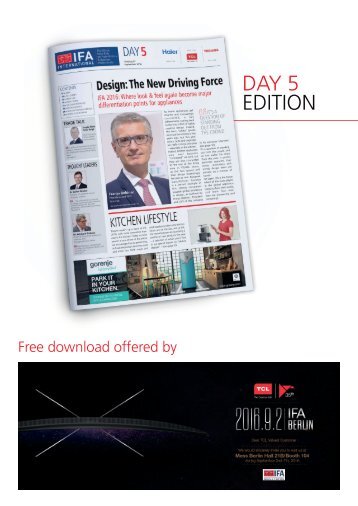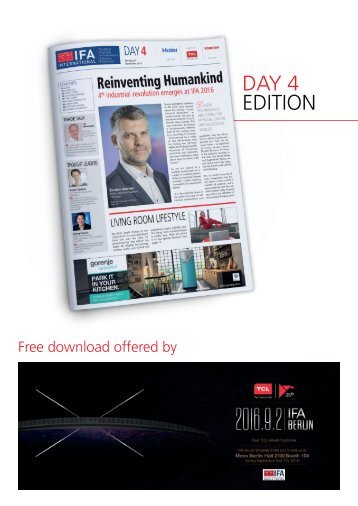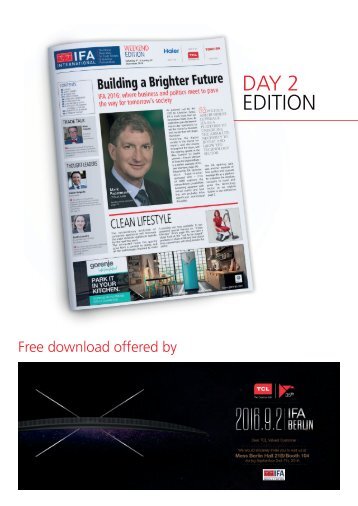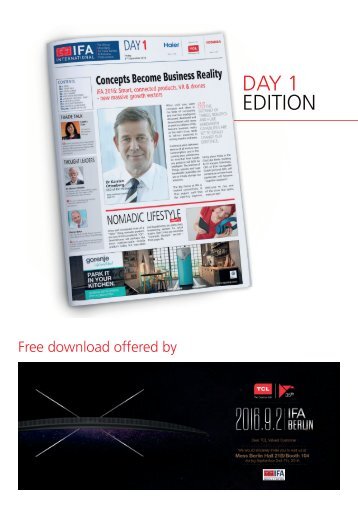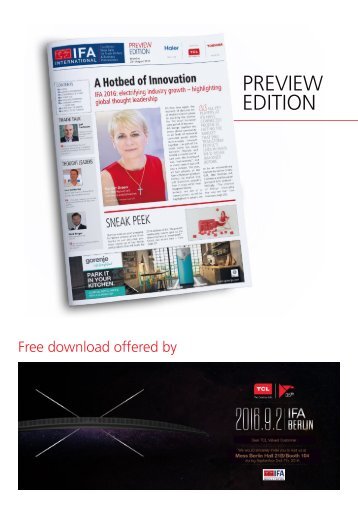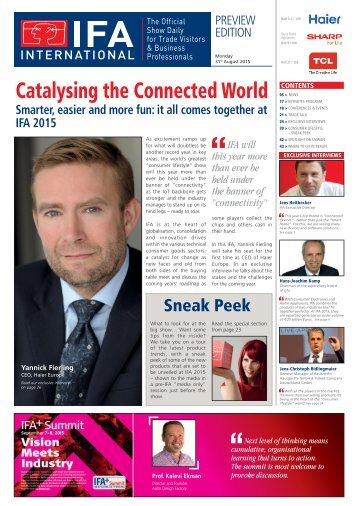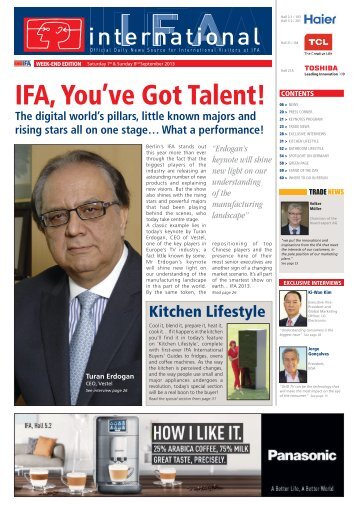
Week-end Edition - Day 2 & Day 3 - IFA International
- Text
- Products
- Consumer
- Appliances
- Consumers
- Germany
- Berlin
- Features
- September
- Electronics
- Lifestyle
- Www.cleverdis.com
SPOTLIGHT ON GERMANY
SPOTLIGHT ON GERMANY Region Chasing a Moving Target Designing home appliances for the year 2030 ANDREAS ENSLIN Born in 1959, Andreas Enslin, has been responsible for the design of Miele appliances since 2006. Prior to work for Miele, he studied industrial design in Munich and worked as head of the Grohe design centre in Hemer. He is the vice-president of the German Association of Industrial Designers (VDID). 56 Interview by Richard Barnes Andreas Enslin heads the design centre at Miele HQ in Guetersloh, Germany. IFA International’s editor in chief, Richard Barnes, travelled to the hallowed halls of the great German brand to discover more about how design rules are changing in the field of home appliances. We asked Enslin what has changed in the seven years since he joined the company. The main thing we needed to change was the processes of the design centre: how to do design, how to get connected to the development processes in the company, to train people with new CAD programmes, but all the time with the mindset of “what is the design of the future?”. We have to build connections between the products and the end-user, looking at the interaction – what happens between the person and the device? We are no longer doing shapes, colours and designs for products, we are designing the relationship between the customer and the product, and knowing everything about this relationship guides us to a shape, a form, and a colour… it makes the design happen. It’s a different way of doing design, and I think it’s necessary to have this in mind for the future, because it helps you understand what happens outside. Of course the company is still a manufacturer, and you see mass production every day. What’s changing fastest? We have access to more and more data and knowledge all the time, but this means there are new opportunities as well. For the customer, what is important is to find out ‘what is really important for me and what will help me’. The decision I felt was right yesterday will probably change tomorrow. You see this in the habits of young people. But doesn’t the fact that Miele is a very solid, established company, make fast change difficult? We have to adapt the company to the way the market is going, otherwise we could become outdated very quickly. It starts with the thinking… with the minds. In Germany, we have always been afraid to fail. “Do not be afraid to fail… try things out!” Especially the designers. We have to try things out, but we have to project far into the future as well. The problem is that the manufacturing processes “We are designing the relationship between the customer and the product” behind the making of a durable product takes time. So it’s a dichotomy. What’s the solution? We try to imagine the year 2030. This is necessary, because we need about five years to bring a new product to the market. So looking 17 years ahead, the product is thus developed 12 years ahead of time. Society, habits, rituals and usage of products will change, because of IT, and new opportunities. So we have built tools, and look at megatrends, and what they mean for society. We produce prototypes, and look at how these new products will help people in Andreas Enslin Head of the design centre at Miele HQ in Guetersloh, Germany their daily lives – wherever they may live in the world. We send teams from the design department on ‘trend travels’ to Asia and the US. They cook with average people in average homes. We listen to their problems and try to understand their wishes. It’s much better than just gathering data. Hall 2.1 Stand 101
SPOTLIGHT ON GERMANY Region Immer Besser The true meaning of ‘forever better’ and the sense of German quality WORLD FIRST Miele has introduced a complete new line of washing machines and tumble dryers at IFA 2013. For the first time ever, virtually 80% of Miele’s products in the category have been renewed in one single bound. “It’s a huge product investment and a huge marketing investment. We are looking forward with great pleasure and confidence to the next year,” said Dr Zinkann. Visitors to IFA will be the first in the world to get a glimpse of these new, innovative products as well as the Generation 6000 built-in appliances. Miele continues to make large gains in market shares, and not just in Germany. “We are experiencing sustainable growth in many of our neighbouring countries, as well as in Russia, Australia, the USA and in key Asian markets too,” said Dr Zinkann. “In Germany and abroad, we owe this success above all else to the expertise and dedication of our staff and our retail partners.” The Miele Company has a long and rich history of high quality engineering. Immer Besser or ‘forever better’ was established early as the company motto and stands for a commitment to the highest quality standards, longevity and improvement - both in production and business practices. This philosophy is as relevant today as it was over 110 years ago. Founded in 1899 by a farmer’s son, Carl Miele, and a salesman, Reinhard Zinkann, the Miele Company is still independently owned by the Miele and Zinkann families. We asked Dr Reinhard Zinkann how he and his partner ensure the perennial nature of quality… Interview by Richard Barnes Quality is a subject that does not just relate to the final product, but it starts with the process of engineering and purchasing parts. It’s a way of thinking. We at Miele think long-term, meaning we look for suppliers who can be long-term partners, and who fulfil our quality standards, and with whom we test every single part for durability of at least 20 years. When I visited the factory in Gütersloh, I was very interested to see that you manufacture many of the internal parts yourselves. That’s something people should maybe know. About 50% of all our parts are produced in-house. There are two reasons for this: it is very hard to find suppliers who fulfil our quality standard in the amount that we demand, at a price that is appropriate. And secondly, we believe that by engineering certain vital parts from the very beginning on, the final product gets better. So if it’s all designed by the same hand, and the engineers start talking to each other from the first product idea on they can come together on very brief notice and can exchange ideas, that helps a lot. What, to you, is German quality? In Germany we have very highly skilled workers. We have a dual education system, which on the one hand has university education and on the other has apprenticeships. In general, people in Germany tend not to move too much, so we at Miele have more than 10,000 employees who have worked for us for more than 25 and even up to 40 years, including those already in retirement. How does the fact that Miele is a privately-owned company change the way you do things? It changes one major point: long term thinking. We are interested in the next generation. Sociologists say an average generation of human beings is 25 years, and our products are made to last 20 years or longer. So we think in generations. Another way to express it is that we feel our heritage is on loan to us from our kids. What’s the secret of your success? For us it is important, and this is our main goal or golden rule, to stay independent as a family business. This means stay independent of banks; stay independent of other stakeholders. Grow yes, but only as fast as your equity. Dr Reinhard Zinkann Managing Director and co-proprietor, Miele “We feel our heritage is on loan to us from our kids.” www.ifa-international.org IFA International • Saturday 7 th & Sunday 8 th September 2013 57
- Page 1:
I FA international Official Daily N
- Page 7: News Philips Moves into Social Medi
- Page 11 and 12: News More from ShowStoppers@IFA THE
- Page 13: News EISA Awards Support Retailers
- Page 17 and 18: News Philips Parties with the Press
- Page 19 and 20: News Panasonic Makes Moves to Suit
- Page 21 and 22: IFA 2013 International Keynotes THE
- Page 23 and 24: Trade News The Expert View Market I
- Page 26 and 27: Exclusive Interview Europe’s Best
- Page 28 and 29: Exclusive Interview When It’s All
- Page 30 and 31: 30 KITCHEN LIFESTYLE
- Page 33: KITCHEN LIFESTYLE Welcome to the Sm
- Page 36 and 37: KITCHEN LIFESTYLE ADVERTORIAL Panas
- Page 39 and 40: BUYERS' GUIDE FRIDGES I FA internat
- Page 41 and 42: KITCHEN LIFESTYLE FRIDGES PRODUCT S
- Page 43 and 44: BUYERS' GUIDE OVENS I FA internatio
- Page 45 and 46: www.ifa-international.org IFA Inter
- Page 48 and 49: KITCHEN LIFESTYLE COFFEE MACHINES P
- Page 50 and 51: KITCHEN LIFESTYLE INNOVATIVE SMALL
- Page 52 and 53: BATHROOM LIFESTYLE [ INNOVATIVE SMA
- Page 54 and 55: SPOTLIGHT ON GERMANY MADE IN GERMAN
- Page 58 and 59: Green Page Grundig Flourishes In Ma
- Page 60 and 61: HOSPITALITY / RESTAURANTS / BARS WH
- Page 62: WHERE TO GO IN BERLIN Bars The Bell
- Page 66 and 67: Hall 1.2 - Stand 121 Hall 1.2 - Sta
- Page 68: BUYERS’ TOOLS FREE AIRPORT SHUTTL
Inappropriate
Loading...
Mail this publication
Loading...
Embed
Loading...

IFA International
- IFA International 2023
- IFA International 2022
- IFA International 2020
- IFA International 2019
- IFA International 2018
- IFA International 2017
- IFA International 2016
- IFA International 2015
- IFA International 2014
- IFA International 2013
- IFA International 2012
- IFA International 2011
- IFA International 2010
- IFA International 2009
- IFA International 2008
- IFA International 2007
